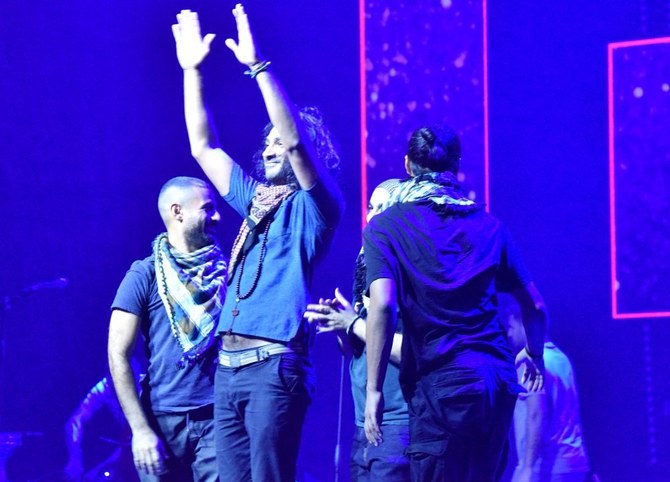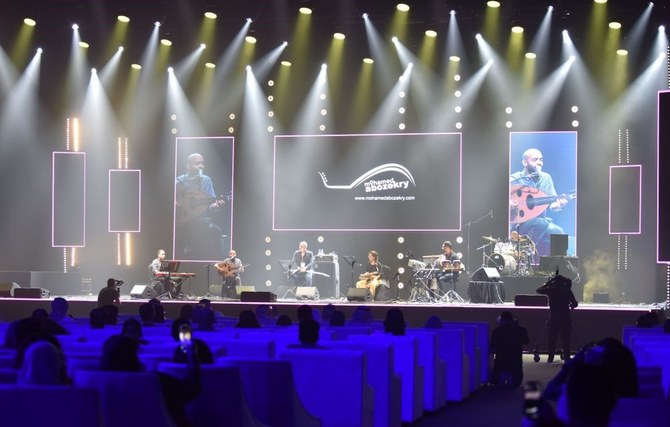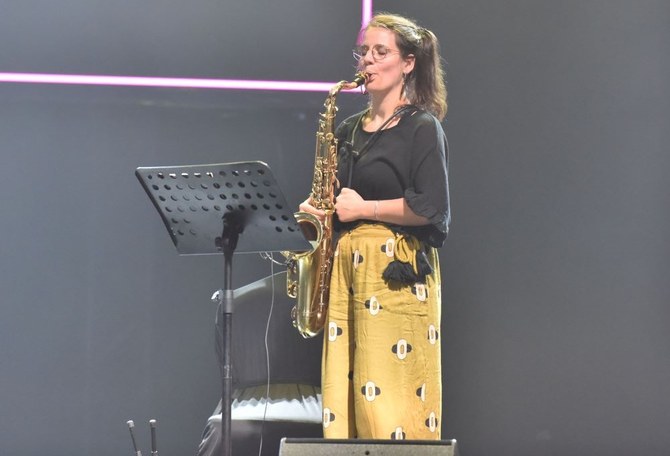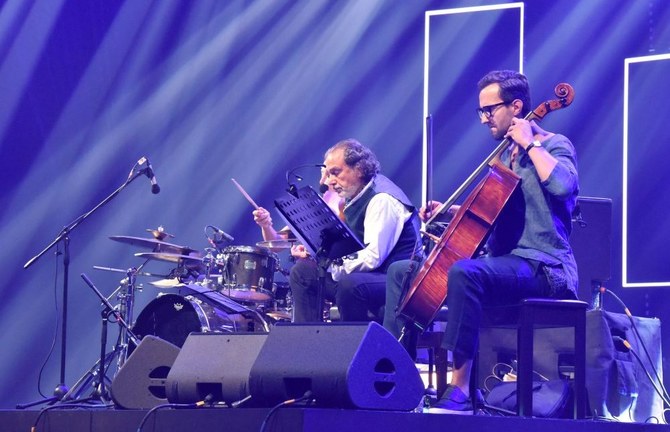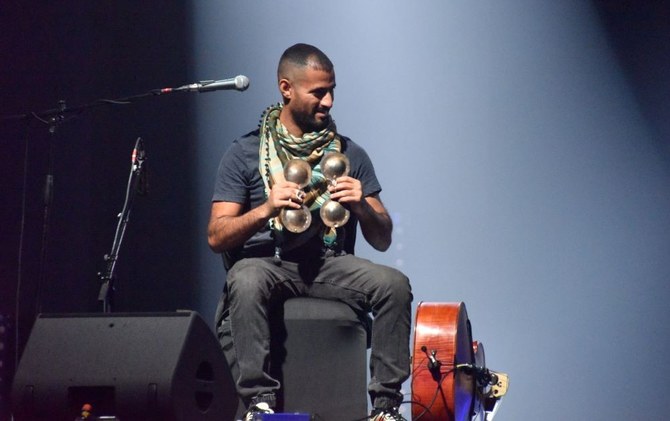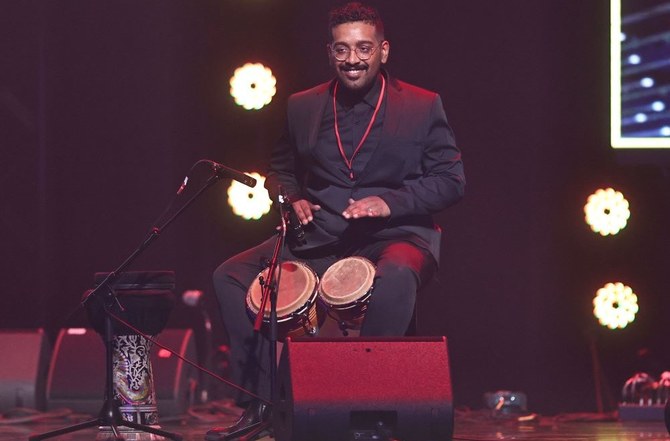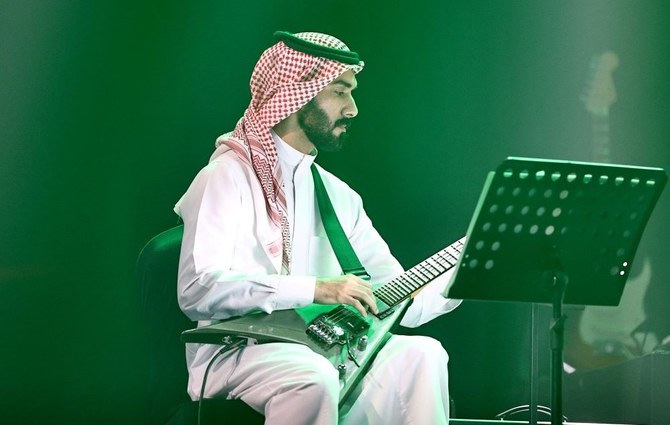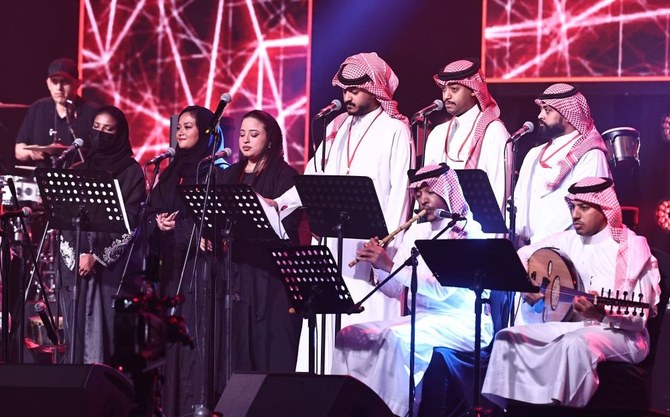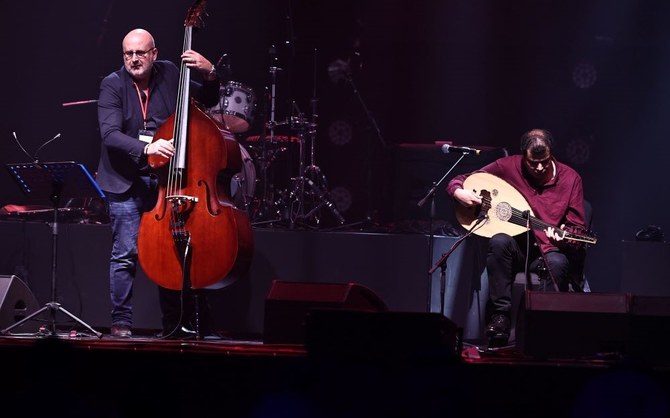DAMMAM: On a humid Friday night, the Dhahran Expo — the venue where people received COVID-19 vaccines over the past year — had a different remedy to offer: Music.
The auditorium, with rows of plush white seats facing the large stage where oud, saxophones and singing inaugurated Shargiyya’s first Arabic Jazz Music Festival, organized by the Music Commission and the Saudi Ministry of Culture.
The lineup consisted of the region’s most well-known jazz musicians and composers from the Middle East and beyond, including award-winning German Jazz Music Award winner and German-Lebanese oud master Rabih Abu Khalil. The Bands Across Borders ensemble, a supergroup featuring leading musicians and top vocalists, instrumentalists, jazz, pop and rock musicians from around the Arab world, joined by legendary European musicians, managed by the renowned Jordanian artist Aziz Maraqa in a jazz orchestra performance of the most well-known Arabic tunes from the region.
The two-day event featured Egyptian oud master, the award-winning Hazem Shaheen in his new jazz formation. Muhammad Abu Zekry also performed, best known for being the youngest officially recognized Arab oud master at only 14 years of age, and has now moved on to being the founder of one of the most invigorating jazz ensembles in France. This lineup was supported by the rising stars from the Saudi music scene, including Bahraini-Saudi fusion band Majaz, Saudi band Al-Farabi, the Saudi National Music Group, featuring the best traditional music from the Kingdom, and Dammam’s very own Jazz fusion band, Mosaic.
The collective sounds of clapping and fingers tapping to the rhythm of the audience members were invisible but audible.
Dammam’s very own local jazz fusion band strummed gently, with no words or lyrics, allowing listeners to fill the gaps with feelings or words of their own. With clear Khaleeji-Latin-American influences, their set almost felt like a sonic collage or soundtrack for the day; upbeat and danceable at times but also melancholy and reflective and slow, too.
Majaz Bahraini band, known for what is referred to as “earth music,” came from across the bridge from Bahrain. With their bombastic, muffled sounds of rock-inspired melodies, the sound was also distinctively Khaleeji, with plenty of clapping. The stage lights also played a critical part in pulsing with the music beats, illuminating the space as audience members instinctively used their hands to clap along or to drum on their knees.
The event started fashionably early — nearly an hour ahead of schedule.
Local band member Fawaz Ba’assam, the lead in Mosaic who also plays keys, was bewildered and exhilarated after the show. Playing in larger venues was something the band hoped for when they formed years ago, but it seemed so far-fetched to be on stage in their hometown when they started — or even just a few short weeks ago.
“The festival is amazing. I’m really happy that that happened. And I’m really glad that happened here in Dhahran and Dammam where we grew up and where we live because it’s always in the big cities; it’s always in Riyadh and Jeddah,” he told Arab News.
Band member and bass guitarist Saud Al-Ashikh also reiterated how the band had to be quick on its feet and jump at opportunities that came to them without much prior notice. The collaboration on stage between both Majaz and Mosaic happened on the spot — they joked that the organizers simply needed to fill 20 minutes to stall for the next performer — so they just went on stage and moved their instruments on the fly. They mentioned how the city only received approval to put together this festival a fortnight ago and, in true jazz spirit, they enthusiastically simply went with the flow and improvised.
“This happened quickly. I didn’t expect five years ago that the Arabic Jazz Music Festival will happen anytime soon. Or even two weeks! Literally, before two weeks, I didn’t expect this. I’m really happy,” Al-Ashikh told Arab News.
Self-proclaimed “music hobbyist,” Ahmed Hindash, moved to Khobar during the pandemic and has been trying to connect with the creative community in Shargiyya ever since. As a Jordanian, he jumped at the chance to hear live music performed by local bands in an attempt to experience Saudi culture better. He serendipitously came across a post about the festival while scrolling through Instagram and immediately booked a ticket for both days — for himself and his friend. During the performance on opening night, he couldn’t help but continuously tap his hands on his legs.
“I’m a big fan of drums, and I enjoy whenever I see a drummer in front of me. I just get into the flow of music, get into the tempo of the music. Majaz, they play this fusion of reggae, Moroccan style, Khaleeji, Bahraini music and this fusion of everything really picks up the whole vibe. It’s a definite unique band that I would enjoy to see them again,” Hindash told Arab News.
Audience members using their hands to show appreciation was definitely the reoccurring theme of the night.
While speaking to Arab News, Majaz wholly agreed.
“There’s something about the claps, I don’t know — everyone can do it. And it’s like, you don’t need any kind of rhythmic knowledge. It’s kind of something that innately comes with every human being; you know how to clap. And think it is a very powerful aspect of our kind of music now that I actually think about it,” Majaz guitarist and vocalist Hameed Al-Saeed told Arab News.
“We want to make the audience feel like they’re a part of this, as well. We want them to immerse in this whole thing. And that’s the beauty of a live show. It’s like, yes, just come be a part of the band with us. Let’s all play together and clap,” Al-Saeed said.




